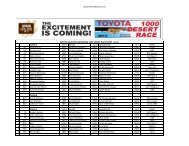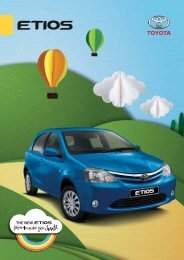to download PDF version - Toyota
to download PDF version - Toyota
to download PDF version - Toyota
Create successful ePaper yourself
Turn your PDF publications into a flip-book with our unique Google optimized e-Paper software.
SOCIAL ASPECTS<br />
Relations with Business Partners<br />
TSAM’s key business partners include<br />
suppliers, who provide components and<br />
materials used in the vehicle manufacturing<br />
and assembling process, and mo<strong>to</strong>r vehicle<br />
dealers selling <strong>Toyota</strong> vehicles in<strong>to</strong> the market<br />
and interfacing directly with cus<strong>to</strong>mers.<br />
They fufill key roles in the supply chain,<br />
and are required <strong>to</strong> comply with TSAM’s<br />
safety, health and environmental standards<br />
as a minimum requirement.<br />
TSAM undertakes risk-based supplier<br />
audits that include safety, health and<br />
environmental criteria. Suppliers are required<br />
<strong>to</strong> supply certificates proving that they comply<br />
with ISO 14001 standards, and approved<br />
labora<strong>to</strong>ry certificates verifying the non-use<br />
of SOCs (please refer <strong>to</strong> page 33 for details<br />
regarding supplier compliance).<br />
Dealers have a standard environmental<br />
manual, and are assessed for compliance<br />
against <strong>Toyota</strong>’s stringent environmental<br />
management system (please refer <strong>to</strong> page 33<br />
of this report for results and details on dealer<br />
compliance for the reporting period).<br />
All dealers are required <strong>to</strong> re-examine<br />
their sites, and <strong>to</strong> budget for environmental<br />
expenditure on upgrades <strong>to</strong> meet water and<br />
waste management expectations. Dealers<br />
are also now required <strong>to</strong> report more fully<br />
on environmental issues, which feed in<strong>to</strong> the<br />
global reporting system for <strong>Toyota</strong>.<br />
According <strong>to</strong> ECO III standards, each<br />
dealer must have at least one environmental<br />
project that is budgeted for and communicated<br />
<strong>to</strong> the public. For example, dealers from the<br />
Barloworld group focus on water issues,<br />
and the Imperial Strijdompark dealership<br />
offers clients a tree <strong>to</strong> plant for each service<br />
completed.<br />
50 <strong>Toyota</strong> South Africa Mo<strong>to</strong>rs Sustainability Report 2010<br />
TSAM recognises that stable partnerships create trust and lead <strong>to</strong> mutual growth<br />
and benefits. Relations with business partners are premised on encouraging them <strong>to</strong><br />
adopt TSAM’s international standards on safety, environmental management, respect<br />
for people, and delivering <strong>to</strong>p quality goods and services.<br />
Barloworld <strong>Toyota</strong> Centurion. All dealers are assessed for compliance against <strong>Toyota</strong>’s stringent environmental<br />
management system.<br />
ECO Status<br />
TSAM established the ECO status<br />
programme in 2005 in order <strong>to</strong> standardise<br />
and improve dealer environmental<br />
management. ECO I is aligned <strong>to</strong><br />
the TMC Dealer Environmental Risk<br />
Audit Programme, and is the minimum<br />
environmental management requirement<br />
for dealers. ECO I status includes the need<br />
for:<br />
• Basic responsibilities assigned for<br />
environmental management at dealers;<br />
• Appoint person in charge of environmental<br />
matters;<br />
• Environmental policy and declare<br />
compliance <strong>to</strong> legislation;<br />
• Management of hazardous waste;<br />
• Management of waste water; and<br />
• Basic HFC/CFC recovery.<br />
ECO II and ECO III status requirements<br />
are very strict, and seek <strong>to</strong> assist dealers <strong>to</strong><br />
improve their environmental management <strong>to</strong><br />
the point that they can achieve ISO 14001<br />
certification. Some of the minimum<br />
requirements for ECO III include:<br />
• The availability of specialised kits for<br />
battery acid spillage;<br />
• Specifications for bunded areas for<br />
waste oil;<br />
• Specifications for waste separation,<br />
disposal and recycling;<br />
• Detailed environmental emergency<br />
plans in place;<br />
• A full environmental objectives and<br />
targets programme is in place; and<br />
• Only indigenous plants are used on<br />
site.





